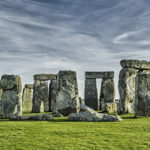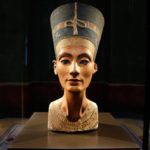 Mysteries
Mysteries  Mysteries
Mysteries  History
History 10 Surprising Stories About the Texas Rangers
 Humans
Humans 10 Philosophers Who Were Driven Mad by Their Own Theories
 Miscellaneous
Miscellaneous 10 Video-Game-Worthy Weapons and Armors from History
 Weird Stuff
Weird Stuff 10 Psychics Who Accurately Predicted Wartime Events
 The Arts
The Arts 10 Pieces of Art Inspired by a Broken Heart
 Health
Health 10 Science Fiction-Sounding New Medical Treatments
 History
History 10 Surprising Facts About the Father of Submarine Warfare
 Space
Space Ten Astonishing New Insights into Alien Worlds
 Weird Stuff
Weird Stuff 10 Bizarre Summer Solstice Rituals Still Practiced Today
 Mysteries
Mysteries Top 10 Haunting Facts About the Ghost Ship MV Alta
 History
History 10 Surprising Stories About the Texas Rangers
 Humans
Humans 10 Philosophers Who Were Driven Mad by Their Own Theories
Who's Behind Listverse?

Jamie Frater
Head Editor
Jamie founded Listverse due to an insatiable desire to share fascinating, obscure, and bizarre facts. He has been a guest speaker on numerous national radio and television stations and is a five time published author.
More About Us Miscellaneous
Miscellaneous 10 Video-Game-Worthy Weapons and Armors from History
 Weird Stuff
Weird Stuff 10 Psychics Who Accurately Predicted Wartime Events
 The Arts
The Arts 10 Pieces of Art Inspired by a Broken Heart
 Health
Health 10 Science Fiction-Sounding New Medical Treatments
 History
History 10 Surprising Facts About the Father of Submarine Warfare
 Space
Space Ten Astonishing New Insights into Alien Worlds
 Weird Stuff
Weird Stuff 10 Bizarre Summer Solstice Rituals Still Practiced Today
10 Famous Gangster Hideouts
Think of the 1920s, and you might picture something along the lines of Leonardo Dicaprio and his portrayal of Jay Gatsby in The Great Gatsby. Images of flapper dresses, a sexual revolution, lavish parties, and the contrasting strict prohibition may also come to mind. Little did the prohibitionists know, they had also essentially opened the door for black market gangs and mobsters to start running the streets in cities across America. Ah, the “roaring twenties” were a good time, right?
Sure—only if you knew the right people.
These gangsters and mobsters were family men by day and cold-blooded killers by night. You probably know a lot of their names: Mickey Cohen, “Bugsy” Seigel, “Baby Face” Nelson, John Dillinger, and of course, the infamous Al “Scarface” Capone. The swagger of these gangsters lives on through their crimes and hideouts.
Many hideouts have become museums or are part of gangster tours in vacation spots. Visiting these hideouts gives tourists a rare glimpse into the life of the 1920s and 1930s gangsters. So grab your zoot suit, and let’s explore ten famous gangster hideouts.
Related: 10 American Mobsters Who Were Not Italian Americans
10 The Almanac Hotel
The Almanac Hotel, located on Broadway Street in NYC, brought a lot of attention to the significance of the gang activity in the city in the early ’30s. Gang leader George “Bugs” Moran was involved in the extortion of several businesses in the area and may have been involved in anonymous letters sent to a man named Leo Bergin. Bergin’s untimely death led to a manhunt for “public enemies.”
Bugs, leader of a Chicago gang, was known to extort several businesses. He may have had several “business” meetings at the Almanac Hotel while expanding his activities to the West Coast.
9 Hurley, WI
Northern Wisconsin was an incredibly popular hideout for these prohibition-era gangsters, particularly in the ’20s. If you’d been around at the time, there was a good chance you’d cross paths with one of them, in some ways hiding in plain sight as they spent time in the otherwise sleepy and secluded town of Hurley.
With plenty of access to nightclubs and brothels, Hurley made for a good place to put your feet up after a long day of smuggling and shoot-outs with other gang members.
8 The Barker Lake Lodge & Golf Course
Nothing says business casual like a round of golf with the boys. Perhaps that’s why the bootlegger and beer baron Joe Soltis opened up his business, the Barker Lake Lodge and Golf Course in Wisconsin. The lodge allowed Soltis to offer a hiding place for his gunmen. Though Soltis might just seem like a rebel at a time when alcohol was illegal, he was not harmless. He was the big boss of a gang rivaling Al Capone’s.
Fun Fact: If you want to play the same nine holes as Soltis, you can still stay at the lodge in Sawyer County, WI. While you’re at it, you could drive over to Chicago, where the Soltis family is still selling beer (legally) at the family brewery.
7 Little Bohemia Lodge
Like most of these gang leaders in this time period, John Dillinger actually had multiple hideouts in various cities around the country. Little Bohemia Lodge in Manitowish Waters, WI, was the site of an epic, notorious shoot-out between Dillinger and the FBI. Oh, and of course, “Baby Face” Nelson was there, too, because these guys were all sort of interconnected.
Apparently, Nelson attempted to escape, running through a marsh. He got a good head start until some civilians spotted him and blew his cover. The lodge owner, a Mr. Emil Wanatka, apparently had the same lawyer as Dillinger, and they were likely acquaintances, considering how often Dillinger frequented the place. Coincidence? Perhaps. Perhaps not. If you want to check out the place, don’t worry. The shoot-out didn’t completely destroy it, and the bullet holes are still there so you can relive the moment like an authentic ’20s gangster.
6 Dillman’s Bay Resort (Cabin #5)
Not far at all from the Little Bohemian Lodge was Dillman’s Bay Resort, another historical place you can still visit. It’s also the site of a Depp movie action scene—Public Enemies. This old haunt was the spot where Dillinger and “Baby Face” Nelson ran to narrowly escape capture by the FBI. Specifically, they stayed in Cabin #5. The FBI attempted to get them out, but, evidently, their time had not yet come.
Despite being recognized by his Chicago-style suit and wing-tipped shoes, Nelson was able to catch a train back to Chicago.
5 Blackstone Hotel
The Blackstone Hotel has a long history as a popular getaway for celebrities, politicians, and, yes, gangsters.
The hotel opened in the 1920s. Famously, it was the place where the Republican candidate, Warren G. Harding, was first selected to represent the elephant party. Harding wasn’t exactly a mobster, but his record is a little questionable considering all the scandals he turned out to be involved in. It may or may not be true that Harding knowingly hired more than one operative of the Ohio gang during his presidency, a true show of the massive amount of power these gangsters held in society at the time.
The hotel also housed a barbershop where Al Capone went when he needed a haircut. After all, he had to look sharp before he went and cut off somebody’s fingers for being cheap with him.
4 Schofield’s Flower Shop
If you hope to buy some flowers for your girlfriend or spouse on Valentine’s Day or your anniversary, you cannot get any at Schofield’s these days. Schofield was the owner, otherwise known as “Big Bill,” perhaps to compensate for something?
This wasn’t exactly the go-to flower shop for your average customer. Still, it was the place to be if you were having a funeral for a fellow gang member. It became the shop supplying the funeral needs of some of the most infamous citizens in Chicago. It may not surprise you to learn Mr. “Bugs” Moran was involved in this business venture as well. After Big Bill’s death, Moran became the new boss of the North Street Gang. Unfortunately, the Depression caused the business to struggle quite a bit, and it eventually went out of business sometime in the ’70s.
3 The Bradford-Ma Barker Home
In case you were beginning to think gang violence was only for men, Ma Barker is here to show you’re wrong. And she gives a whole new meaning to the phrase, “Mama’s Boy.” Ma Barker and her son posed as a vacationing couple and purchased a home in Ocklawaha, Florida, while she was on the run.
This notorious, violent robber rightfully earned herself a spot on the FBI’s Most Wanted List until she was eventually found and gunned down in the longest gun battle in FBI history. By the way, if you’re in the market for a new family home, hers is apparently for sale. However, you just might want to hope her ghost isn’t carrying a gun.
2 The Flamingo Hotel
Beverly Hills is the place for the rich and famous…and the infamous. It was the home where Bugsy Seigel, not to be confused with Bugs Moran, was eventually violently murdered while visiting the home of his wife and children. However, prior to the bootlegger and gambler’s violent death, he enjoyed plenty of time gambling away his life in casinos in Vegas.
Bugsy was the owner of his own casino in Las Vegas, Nevada: The Flamingo Hotel. There, he participated in the lifestyle of a gangster: money, infidelity, and unlawful business ventures were just part of an average day in the life of Seigel, who is portrayed fairly accurately according to what I’ve read and seen of the 1991 mafia film Bugsy.
Seigel was associated with another famous criminal, “Lucky” Luciano. He eventually became one of his hitmen, which probably led to revenge back in Beverly Hills. The Flamingo hotel is still up and running and is the oldest hotel on the Vegas strip still in operation.
1 Capone’s Miami Mansion
When I first mentioned 1920s gangsters, you probably assumed I’d say one of the most well-known, notorious gangsters ever to live. Yes, I’m talking about The Real Scarface, otherwise known as Al Capone. Yes, Al may not have done anything particularly “worse” than the other gangsters mentioned thus far. See, what stood out about Capone was his ability to strike fear into the hearts of his contemporaries—many of whom were the most ruthless gangsters operating at the time.
Though Capone certainly had several hideouts, including a spot in Canada, his mansion in Miami is one of the more well-known.
Capone reportedly paid around $40,000 for the mansion, which sports white halls, a cabana for pool parties, and a guesthouse. The house’s value is now somewhere around $17 million, though it could go for even more considering the historic interest of the place.
After Capone completed his sentence in Alcatraz, he returned to the house. It was there that he died from a heart attack in 1947. He was almost fifty.








